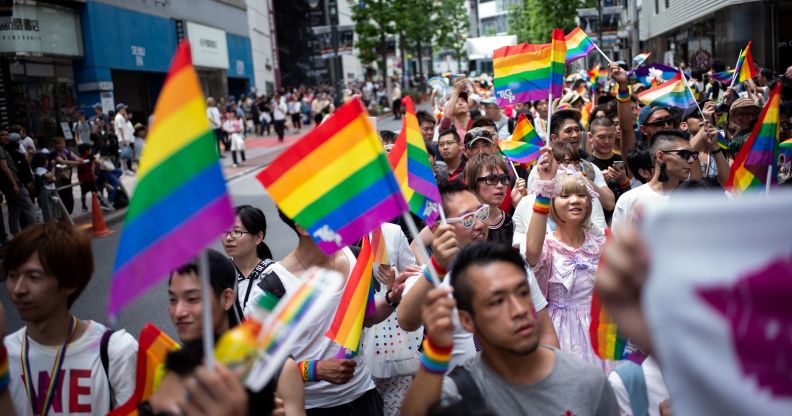A queer man was murdered. His grieving partner of 20 years has just been told their relationship wasn’t legally valid

The Japanese LGBT community attends the annual Tokyo Rainbow Parade, 2018. (Martin BUREAU / AFP)
The Japanese LGBT community attends the annual Tokyo Rainbow Parade, 2018. (Martin BUREAU / AFP)
A court in Japan has ruled that same-sex relationships are not “de facto marriages”, and have said that the grieving partner of queer man who was murdered cannot receive survivor’s benefits.
Hideaki Mizuno was murdered by a colleague in December 2014, and his killer was sentenced to 14 years in prison, according to Kyodo News.
Mizuno, who was 52 at the time of his death, had lived with his partner Yasuhide Uchiyama, 45, for around 20 years.
In December 2016, Uchiyama claimed survivor’s benefits, a system that is designed to ease emotional and financial stress suffered by surviving family members of crime victims.
But his claim was denied, as the same-sex couple, who had been living together for two decades, were not recognised as family by the government.
Japan will not recognise same-sex relationships.
Uchiyama filed a lawsuit challenging the decision, but on Thursday, June 4, presiding judge Masatake Kakutani at the Nagoya District Court said in the hearing: “I cannot recognise same-sex relationships as de facto marriages.”
The judge added that in order for Uchiyama to be recognised as a family member and access benefits, “two people of the same sex living together must first be regarded as equal to marriage in society.”
Uchiyama’s lawyers said they are planning to appeal the ruling, and said: “It is an extremely regrettable ruling which perpetuates discrimination against sexual minorities.”
The grieving queer man said at a press conference following the trial: “It is extremely disappointing that my request was rejected on the basis that same-sex couples are not sufficiently accepted in society.”
Although many areas in Japan offer certificates to same-sex couples allowing them some rights, same-sex marriage has not been legalised.
A group of 13 gay couples filed lawsuits on Valentine’s Day last year against the Japanese government claiming damages for the lack of recognition of marriage equality.
The plaintiffs argue that current laws in Japan surrounding same-sex marriage violate their constitutional right to equality.

